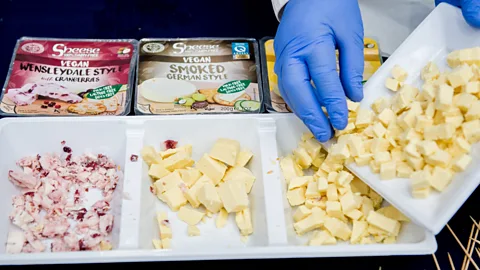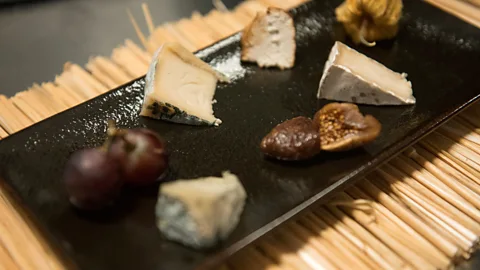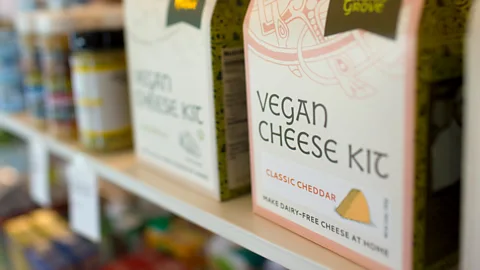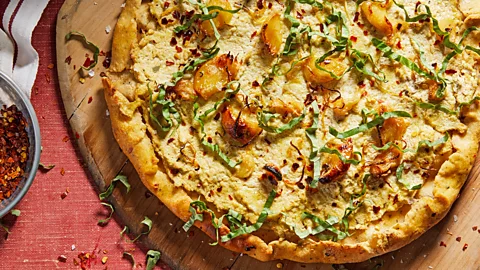How vegan cheese is made without milk
 Getty Images
Getty ImagesVegan cheese is now ubiquitous, but few people seem to know what it's actually made of. Here's the lowdown on this delicious-yet-enigmatic substance.
They may seem synonymous with modern life, but meat and dairy-free alternatives have been around for centuries. Fermented tofu, which originated in China, for example, has been consumed for around 1,500 years.
The first development of the modern era occurred in the late 1800s, when the doctor, businessman and health activist John Harvey Kellogg – the man behind the cereal brand – invented a range of dairy-free cheese alternatives, including Nuttolene, a product made from nuts that had "the consistency of cream cheese".
By the 20th Century, dairy-free alternatives were readily available, partly thanks to the Beijing-born educator, politician and political activist Li Yu-Ying (also known as Li Shizeng), who was instrumental in bringing soy-based products from East to West. In 1911, he established a soy "dairy" near Paris and, from there, produced fermented tofu "cheese".
These early products gradually evolved into those that more closely resembled, and were marketed as alternatives to, cheese. But until recently, there were only a small number of dairy-free cheese alternatives available on shelves.
While meat-free burgers have been making headlines in recent years, dairy-free cheese alternatives have been lagging behind in popularity until very recently. But the stakes are higher now – soaring demand for plant-based alternatives to meat and dairy has pushed huge innovations in recent years to ensure people can swap their favourite foods for more realistic vegan alternatives.
You might also like:
While there are now realistic meat alternatives, even down to the heme compounds that contribute to its colour and flavour, getting to the heart of what makes cheese taste and act like cheese is much more of a challenge, says Ellie Brown, founder of vegan cheesemaker Kinda Co.
This is because cheese has a unique structure that allows it to be solid at room temperature, and melt at a higher temperature. Some vegetable fats can do the same – coconut oil and palm oil, for example, which are both common ingredients in vegan cheeses. But animal cheese can also do something that is difficult to replicate using plant-based ingredients – stretch as it melts. What makes animal cheese go gooey and bubbly when grilled is a protein found in cow's milk called casein. So far, no one has found a vegan alternative.
Thankfully, vegan cheese-makers agree that dairy-free alternatives have become much more appetising over the last decade. This is largely thanks to one ingredient: cashew nuts.
 Getty Images
Getty ImagesCashews – chosen for their relative creaminess – can be blended into a paste and then fermented, before other ingredients are added to achieve different flavours, such as truffle or chilli.
Much like the processes used to make dairy cheese, artisan vegan cheesemaker Tyne Chease leaves fermented cashews to age for up to two weeks, depending on the product. Cream cheese, for example, isn’t left to age at all.
"A lot of smaller and artisanal brands use similar processes to dairy – fermenting, smoking, ageing and adding herbs and spices. It's just that the starter materials are different," says managing director James Deane.
When the Newcastle-based company launched in 2014, making vegan cheese out of nuts was a new concept, but now, although the cultures and ratios may differ slightly, this is the process many vegan cheese companies use, says Deane.
Tyne Chease's cashew nut base only contains water, salt, cultures and cashew nuts, and has around 12 to 13g of protein per 100g – almost as much protein as there is in prawns or eggs, although only around half the protein found in cheddar cheese.
Cheeses that contain cashews and little else may be healthier than some dairy versions because they tend to be lower in saturated fat (though they may still contain moderate levels of salt).
But relying so heavily on cashew nuts creates an ethical issue for the industry. They grow in tropical climates, including in parts of West and East Africa and India. But there are concerns that farmers aren't always given the correct protective gear to extract the nuts from their shells.
"There's a huge movement trying to get cashews ethically sourced and make sure the entire supply chain is as ethical as possible," says Deane, who only works with supplies who are members of trade organisation Sedex.
And cashews aren't the only main ingredient used in vegan cheeses. Many companies use oils, like coconut oil, which is solid at room temperature and liquid at higher temperatures. One possible concern is that this is very high in saturated fat – coconut oil contains around 82% saturated fat compared to 63% in butter and only 39% of lard. However, vegan cheesemakers argue that people don't eat cheese, or vegan alternatives, for the health benefits.
"I don't think anyone consuming vegan cheese thinks it's healthy," says Chantelle Adkins, director of business development at the Vegan Society. "That's not the intention of vegan cheese – the intention is to give a component to a dish. It's a misconception that vegans are healthy all the time."
 Getty Images
Getty Images"But you want to eat oil-based products sparingly," says Adkins. A recent study into the nutritional profiles of 245 different non-dairy cheeses found that 60% contained high levels of saturated fat, while most contained little protein. Just 15% of those studied had low levels of salt.
To make vegan cheese slightly more nutritious, Adkins predicts that fortifying them with vitamins such as B12, which is found in dairy milk, will be a focus for vegan cheesemakers in the near future.
MozzaRisella, a company producing vegan mozzarella, uses coconut oil alongside sprouted brown rice, which is pressed and mixed with water and apple vinegar. Making vegan cheese this way isn't as complicated as it might sound, says Mauro Vendramin, the company's UK sales manager – despite its first prototype turning out blue.
This was 10 years ago, when vegan food wasn't as popular or accessible. In fact, "vegan" was still a "bad word", Vendramin says, and vegan cheese was mostly sought after by people who were intolerant to lactose, which is found in dairy cheese.
Now, thanks to more people cutting down on their meat and dairy intake, Vendramin says flexitarians make up a large and expanding portion of its customer base.
But coconut oil brings its own ethical issues, as coconuts are often grown in areas of extreme poverty, mostly in Indonesia and the Philippines.
For example, research by the British not-for-profit organisation Ethical Consumer on the ethics of 19 vegan cheese companies found that only one of the vegan cheese company they looked at uses Fairtrade coconut oil, says Ruth Strange, a writer and researcher at Ethical Consumer. "The other companies aren't really talking about how they're sourcing it," she says.
On the plus side, most companies in the industry are producing their own vegan cheeses – rather than outsourcing the production to a factory elsewhere – which helps to minimise ethical issues that are sometimes found with companies who have long supply chains, such as low wages and dangerous working conditions, Strange says.
Alongside the vegan cheese companies capitalising on the rise of flexitarians, numerous companies are working to bring cell-based cream cheese to supermarket shelves.
US company Perfect Day, for example, has figured out how to make animal-product-free protein that is structurally identical to the protein in cow's milk, without involving animals. The process involves "microflora" – microorganisms such as yeast cells or bacteria, it's not clear which in this case – that have been genetically engineered to contain the instructions for making whey proteins. The microorganisms are grown up in containers, where they survive on fermentation and make large amounts of the whey protein in return.
 Getty Images
Getty ImagesThe final product isn't yet commercially available, but in the meantime, other vegan cheese companies are also innovating to get closer to the experience of dairy cheese.
Over the last four years, product development and innovation in the industry has been "insane", says Adkins. Now companies are looking for other ingredients that could offer a taste and texture to rival cashew nuts. Tyne Chease, for example, is experimenting with seeds and oats, as well as trying different ratios.
The industry is putting a lot more investment into research and development now, Brown says, due to growing interest from people wanting to cut down or cut out animal products.
"People are always coming up with new methods – like recipes that use rice flour or using sourdough starter to ferment their cheese. There's lots of fun things to play around with," she says.
But some argue that no one has yet managed to fully replicate dairy cheese's taste or texture.
"Crumblier cheeses, such as extra mature cheddar, are slighter harder than mozzarella," Adkins says. "Also, replicating the taste of extra mature cheddar is probably a bit further away – its flavour and taste is escaping everyone."
For the moment, it seems vegan cheesemakers must choose between replicating the taste, or the texture, of cheese. Brown, for example, chooses to focus on taste over texture, because she says it's difficult to achieve both.
"Big companies with big budgets will figure these things out," she says.
While vegan cheese arguably has some way to go before it reaches the heights of the plant-based burger analogues we see on supermarket shelves, there's no doubt our options are better than they have ever been. In the meantime, vegan cheesemakers are rolling their sleeves up and enjoying the challenge.
If you liked this story, sign up for the weekly bbc.com features newsletter, called "The Essential List" – a handpicked selection of stories from BBC Future, Culture, Worklife, Travel and Reel delivered to your inbox every Friday.
